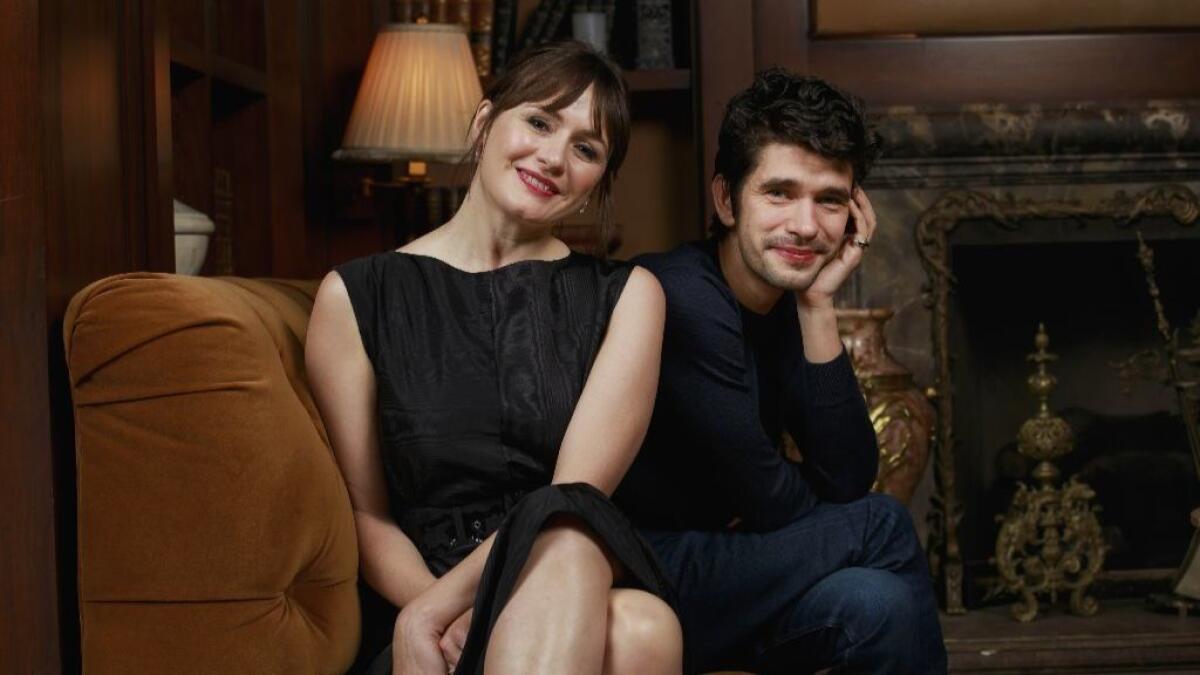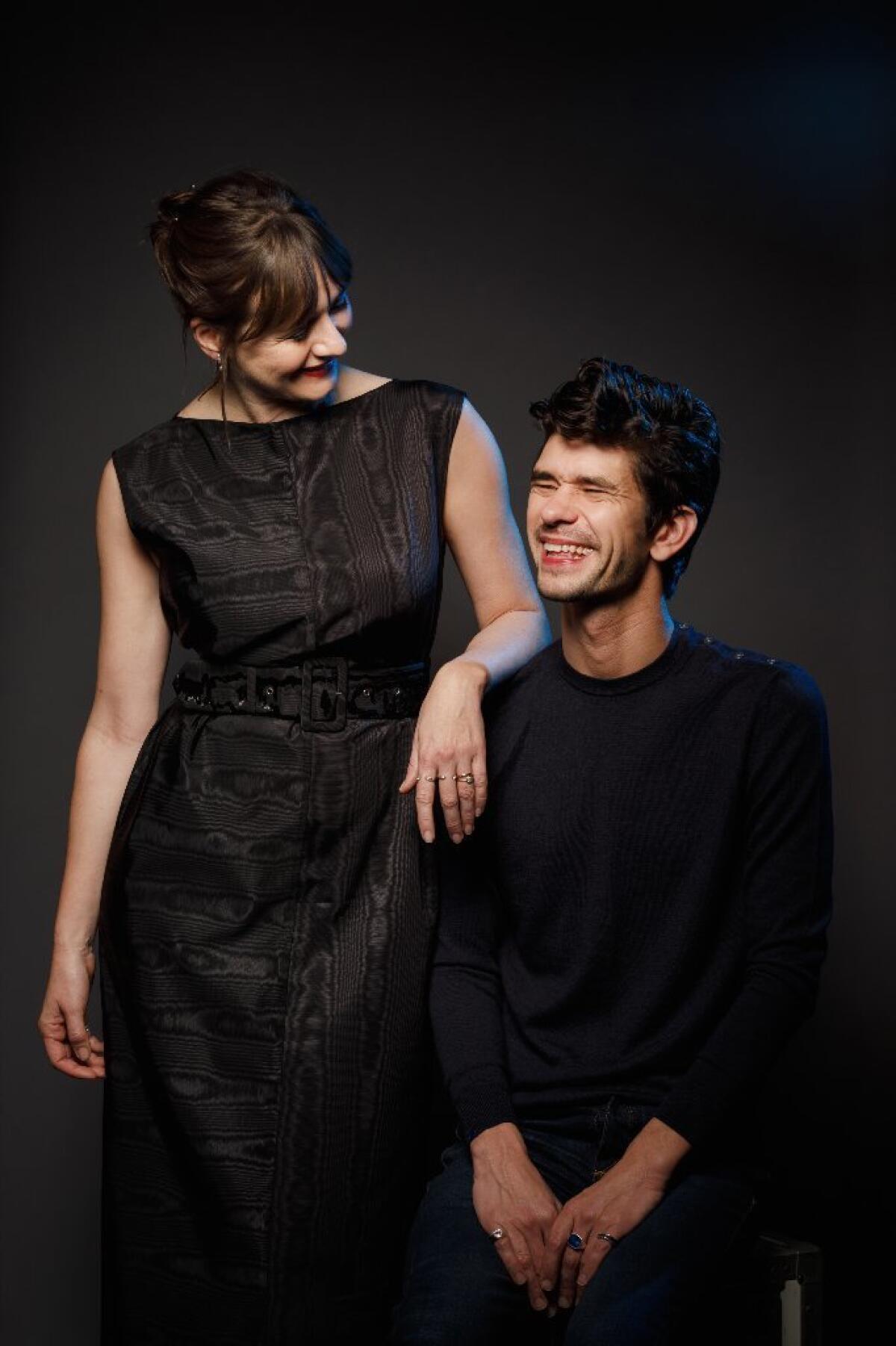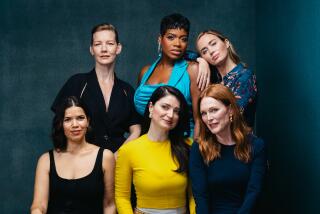‘Mary Poppins Returns’ bonded Ben Whishaw and Emily Mortimer as Banks siblings and best friends

Emily Mortimer and Ben Whishaw have spent the entire day of interviews in tandem, telling reporter after reporter about their shared experience of playing the adult Jane and Michael Banks in Disney’s “Mary Poppins Returns.”
But it’s been 18 months since they were last together. Although they’ve texted a ton since then, all they want to do is get through these conversations with the press so they can just talk to each other.
“I feel like I’ve told Ben things I’ve never told another living soul,” said Mortimer, 47. “He’s one of the sort that you just want to tell him everything. And a lot has happened in this year and a half, and I need to really get down to it, but I don’t know when ...”
“We’ll get to it, we’ll have a moment,” reassured Whishaw, 38. “We really did talk about everything under the sun. Sometimes, the acting was almost second to our discussion!”
It’s hard to believe that before rehearsals began for the movie-musical sequel, the two British actors hadn’t ever met, since they now seem as close as the siblings they play on-screen.
“From the minute it began, I was taken by Ben,” Mortimer recalled. “In some ways, he’s a very serious person and everything, but then he just gives you this irreverent look that’s immediately so disarming.”
Hearing this descriptor, Whishaw laughed — a common occurrence when these two are together. “I felt like I could be a child with you,” he told her. “I mean, even when we were on that fake set, all made out of cardboard boxes, we’d just come off every scene cracking up. I don’t really remember what happened!”
Directed by Rob Marshall and starring Emily Blunt, “Mary Poppins Returns” is set 20 years after Disney’s beloved Julie Andrews classic “Mary Poppins,” right in the midst of the Great Depression. Mortimer’s once-giggly Jane Banks now prefers pants over dresses and works as a union organizer for a group called SPRUCE — the Society for the Protection of the Rights of the Underpaid Citizens of England.
This occupational choice is more than just an echo of Jane’s suffragette mother, who marches for women’s right to vote in the first film. “I learned that, apparently, there was the Marriage Law, which meant that it was illegal for women to be married and have a job at that time,” Mortimer explained. “Jane had really chosen her vocation over any hope of love or romance.”
Meanwhile, Whishaw’s Michael Banks, whom Poppins called a “codfish” for his oft-dropped jaw, grew up and pursued painting as a profession. But he pushed that passion aside for a more practical, part-time job as a bank teller to support his three children. Still, he’s so overwhelmed by the death of his late wife, Kate, that he’s having trouble keeping track of the bills, including a debilitating loan on 17 Cherry Tree Lane.
“He’s trying very hard to just keep the whole thing ticking along, and I suspect he hasn’t really dealt with his grief,” Whishaw noted . “That’s partly what the story is about.”

That’s exactly why the details of Kate’s death are never explicitly stated. “We didn’t want the audience to get caught up in how it happened,” said screenwriter David Magee. “So many movies focus on the death itself, and we wanted to explore how Mary Poppins helps this family deal with the aftermath of that loss.”
Confronting grief so directly in a family film is part of what fascinated Whishaw (who also voiced Paddington in the recent acclaimed kid-friendly films) about the gig. “The tragedy is really at the center of the story so it’s not glossed over, but it’s also not dark or heavy,” he said.
“It’s really about how impermanent and fragile everything is and how we don’t know how long anything is going to last or what’s coming next,” he continued. “It felt like quite a brave thing to do, because sometimes people tread so carefully around children.”
Mortimer agreed. “Death is universal, along with birth; it happens to everyone and yet we’re so not prepared for it, especially in our culture,” she reflected.
“Often in movies with death, you feel like you have to trundle out the big moments of devastation,” she added. “Rob kept steering us away from that and always keeping it light and ball-in-the-air. I think what happens then is it becomes heartbreaking, because you see these people trying to be jolly in the face of something very sad.”
Throughout the large-scale production, the onscreen siblings kept things light with bits of raunchy humor. “The trouble with being on the set of something so lovely and magical is that you get very dirty and venial, and you want to say the worst things that comes into your head,” Mortimer said, laughing, turning to a chuckling Whishaw.
“We were saying that Michael and Ellen” — the family housekeeper, played by Julie Walters — “had a secret love affair,” she continued. “And we were being filthy about all the unspeakable things that are coming out of Mary Poppins’ carpet bag, like sex toys and handcuffs. You could so quickly get R-rated!”
These jokes helped them get through their most daunting musical moments. For Whishaw, that ask was performing the tear-jerking ballad “A Conversation,” about losing his wife and trying to raise three young children alone.
“I’m not a singer and had no idea what I was supposed to do,” he said. “Rob told me not to worry about hitting the notes, but to just inhabit the character in the situation. He said, ‘That’s what a great singer does,’ and I had never thought about it that way.”
The strategy worked. Lin-Manuel Miranda, the musical theater maven who plays a new character named Jack, was notably affected by Whishaw’s performance. “When I saw him sing that song, that was revelatory to me,” he told The Times. “It’s so moving and so powerful.”
Mortimer wasn’t afraid of the high notes; rather, she’s terrified of heights. At first, she wasn’t too enthusiastic about the film’s finale “Nowhere to Go but Up,” in which the entire Banks family floats high over London via magical balloons.
“I was so scared to be singing while up 40 feet in the air, or whatever it was!” she said. “But Rob was so encouraging about the whole thing. You feel like you could almost really fly.”
Twitter: @cashleelee
More to Read
The biggest entertainment stories
Get our big stories about Hollywood, film, television, music, arts, culture and more right in your inbox as soon as they publish.
You may occasionally receive promotional content from the Los Angeles Times.











